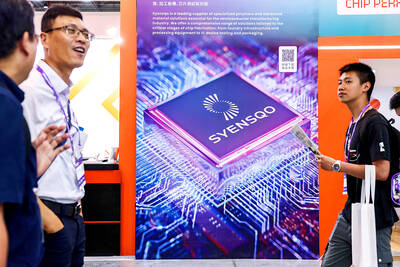Samsung Electronics Co has begun making its fold and flip smartphones as well as its latest Galaxy S23 flagship in India, renewing its focus on a key growth market where Chinese devices have eaten into its sales.
The South Korean giant’s Indian unit previously imported some of its premium flip and fold devices into the world’s second-biggest smartphone market, but it is now assembling its entire phone portfolio locally, said Raju Pullan, the head of Samsung’s Indian mobile business.
“That also builds on our strong commitment to growing the India market,” Pullan said yesterday, declining to comment on whether the locally assembled flagship devices would be priced lower than the imported ones.

Photo: CNA
Global smartphone leader Samsung has faced stiff competition from Chinese rivals in an Indian market characterized by cost-conscious shoppers.
China’s Xiaomi Corp (小米) was India’s biggest smartphone vendor last year with a market share of 20 percent, while Samsung was a close second at 19 percent, research firm Canalys said.
For years, lower prices, bigger batteries and a marketing blitz resting on cricket and Bollywood have helped Chinese device makers outsell Samsung.
Samsung has been slow to learn, but is gradually catching up by launching more affordable devices, tying up with banks for credit card offers and rolling out a consumer credit program that helped it sell devices worth US$1 billion last year, Pullan said.
Like rival Apple Inc, Samsung is also participating in Indian Prime Minister Narendra Modi’s manufacturing drive that aims to turn India into an export hub.
Still, Samsung has struggled to collect some of the financial incentives it has sought from the Modi administration, even as manufacturers including Apple supplier Foxconn Technology Group (富士康科技集團) have succeeded with their claims.
Samsung, which last week unveiled its latest iPhone-rivaling Galaxy S23 line, received orders for nearly 140,000 units worth about 14 billion rupees (US$169.3 million) in India in the 24 hours after the launch, Pullan said.
That is double the orders Samsung received for the previous generation of Galaxy devices on the first day.
The company is increasing the number of stores where it sells the Galaxy devices, and investing more in sales and marketing, Pullan said.

SEMICONDUCTOR SERVICES: A company executive said that Taiwanese firms must think about how to participate in global supply chains and lift their competitiveness Taiwan Semiconductor Manufacturing Co (TSMC, 台積電) yesterday said it expects to launch its first multifunctional service center in Pingtung County in the middle of 2027, in a bid to foster a resilient high-tech facility construction ecosystem. TSMC broached the idea of creating a center two or three years ago when it started building new manufacturing capacity in the US and Japan, the company said. The center, dubbed an “ecosystem park,” would assist local manufacturing facility construction partners to upgrade their capabilities and secure more deals from other global chipmakers such as Intel Corp, Micron Technology Inc and Infineon Technologies AG, TSMC said. It

EXPORT GROWTH: The AI boom has shortened chip cycles to just one year, putting pressure on chipmakers to accelerate development and expand packaging capacity Developing a localized supply chain for advanced packaging equipment is critical for keeping pace with customers’ increasingly shrinking time-to-market cycles for new artificial intelligence (AI) chips, Taiwan Semiconductor Manufacturing Co (TSMC, 台積電) said yesterday. Spurred on by the AI revolution, customers are accelerating product upgrades to nearly every year, compared with the two to three-year development cadence in the past, TSMC vice president of advanced packaging technology and service Jun He (何軍) said at a 3D IC Global Summit organized by SEMI in Taipei. These shortened cycles put heavy pressure on chipmakers, as the entire process — from chip design to mass

People walk past advertising for a Syensqo chip at the Semicon Taiwan exhibition in Taipei yesterday.

NO BREAKTHROUGH? More substantial ‘deliverables,’ such as tariff reductions, would likely be saved for a meeting between Trump and Xi later this year, a trade expert said China launched two probes targeting the US semiconductor sector on Saturday ahead of talks between the two nations in Spain this week on trade, national security and the ownership of social media platform TikTok. China’s Ministry of Commerce announced an anti-dumping investigation into certain analog integrated circuits (ICs) imported from the US. The investigation is to target some commodity interface ICs and gate driver ICs, which are commonly made by US companies such as Texas Instruments Inc and ON Semiconductor Corp. The ministry also announced an anti-discrimination probe into US measures against China’s chip sector. US measures such as export curbs and tariffs